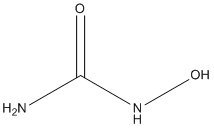All AbMole products are for research use only, cannot be used for human consumption.

Hydroxyurea (NSC-32065) is an antineoplastic agent that inhibits DNA synthesis through the inhibition of ribonucleoside diphosphate reductase. Hydroxyurea is converted to a free radical nitroxide (NO) in vivo, and transported by diffusion into cells where it quenches the tyrosyl free radical at the active site of the M2 protein subunit of ribonucleotide reductase, inactivating the enzyme. The entire replicase complex, including ribonucleotide reductase, is inactivated and DNA synthesis is selectively inhibited, producing cell death in S phase and synchronization of the fraction of cells that survive. Repair of DNA damaged by chemicals or irradiation is also inhibited by hydroxyurea, offering potential synergy between hydroxyurea and radiation or alkylating agents. Hydroxyurea also increases the level of fetal hemoglobin, leading to a reduction in the incidence of vasoocclusive crises in sickle cell anemia. Levels of fetal hemoglobin increase in response to activation of soluble guanylyl cyclase (sGC) by hydroxyurea-derived NO.
| Cell Experiment | |
|---|---|
| Cell lines | Erythroid cells |
| Preparation method | Obtain erythroid cells from peripheral blood of the same patients(Thirteen β-Thal/HbE patients which are treated with hydroxyurea orally for 2 years at a starting dose of 5 mg/kg/day for 5 days/week with escalation to a maximum of 10 mg/kg/day) 1 year after they had stopped hydroxyurea treatment are treated with hydroxyurea in vitro.Treatment of cells performs in primary culture with 30 μM hydroxyurea for 96 hours. |
| Concentrations | 30 μM |
| Incubation time | 96 h |
| Animal Experiment | |
|---|---|
| Animal models | Female athymic (nu/nu) nude mice(used for xenograft model) |
| Formulation | saline |
| Dosages | 1500 mg/kg |
| Administration | i.p. |
| Molecular Weight | 76.05 |
| Formula | CH4N2O2 |
| CAS Number | 127-07-1 |
| Solubility (25°C) | DMSO 50 mg/mL Water 30 mg/mL |
| Storage |
Powder -20°C 3 years ; 4°C 2 years In solvent -80°C 6 months ; -20°C 1 month |
[1] Martin Griesshammer, et al. A review of hydroxyurea-related cutaneous adverse events
[3] Patrick T McGann, et al. Hydroxyurea therapy for sickle cell anemia
[4] Orah S Platt. Hydroxyurea for the treatment of sickle cell anemia
| Related DNA/RNA Synthesis Products |
|---|
| AV-153 free base
AV-153 free base is an antimutagenic. AV-153 free base intercalates to DNA in a single strand break and reduces DNA damage, stimulates DNA repair in human cells in vitro. AV-153 free base interacts with thymine and cytosine and has an influence on poly(ADP)ribosylation. |
| Deoxyribonucleic Acid (from Salmon sperm)
Deoxyribonucleic Acid (from Salmon sperm) can be used as a research reagent, widely used in molecular biology, pharmacology and other scientific research. |
| GSK4418959
GSK4418959 (IDE275) is a non-covalent, reversible, selective and orally active WRN helicase inhibitor. GSK4418959 inhibits ATPase and DNA unwinding functions in an ATP-competitive manner. |
| Dencatistat
Dencatistat (P115) is an inhibitor of Cytidine Triphosphate Synthase 1 (CTPS1) with an IC50 value of ≤ 0.1 μM. |
| Antipain dihydrochloride
Antipain dihydrochloride is a protease inhibitor. Antipain dihydrochloride inhibits N-methyl-N'-nitro-N-nitrosoguanidine (MNNG)-induced transformation and increases chromosomal aberrations. Antipain dihydrochloride also restricts uterine DNA synthesis and function in mice. |
All AbMole products are for research use only, cannot be used for human consumption or veterinary use. We do not provide products or services to individuals. Please comply with the intended use and do not use AbMole products for any other purpose.


Products are for research use only. Not for human use. We do not sell to patients.
© Copyright 2010-2024 AbMole BioScience. All Rights Reserved.
